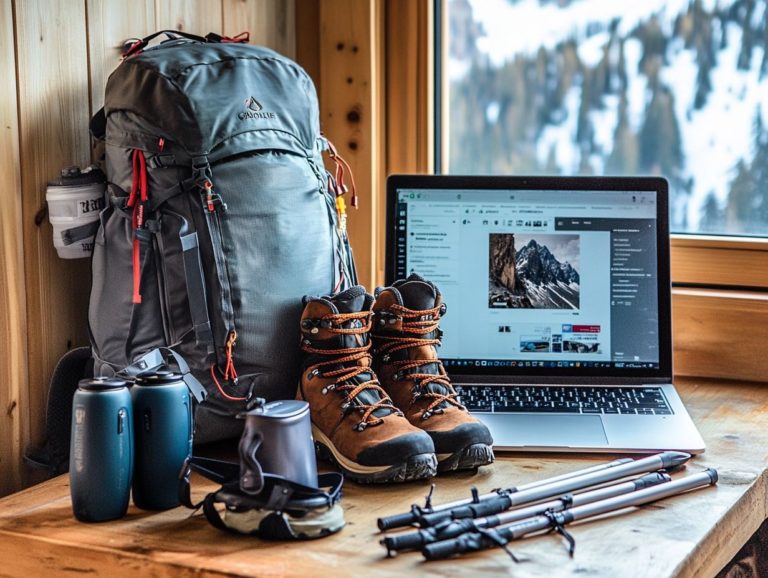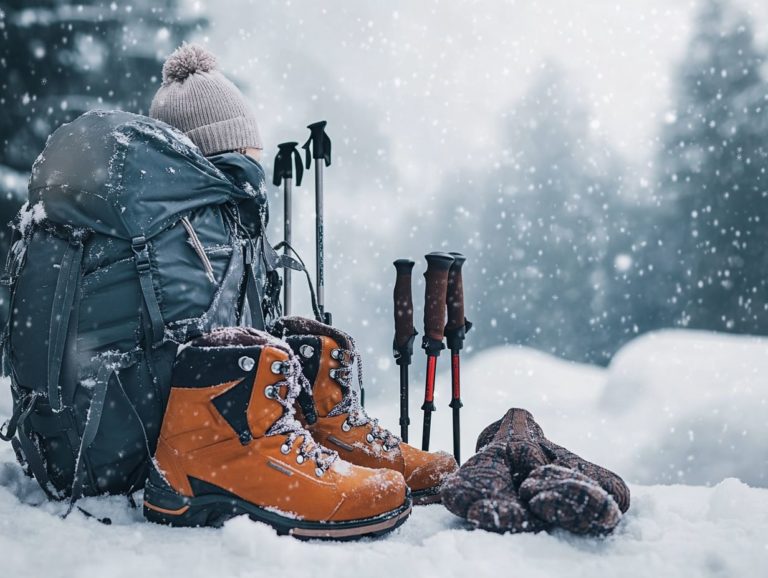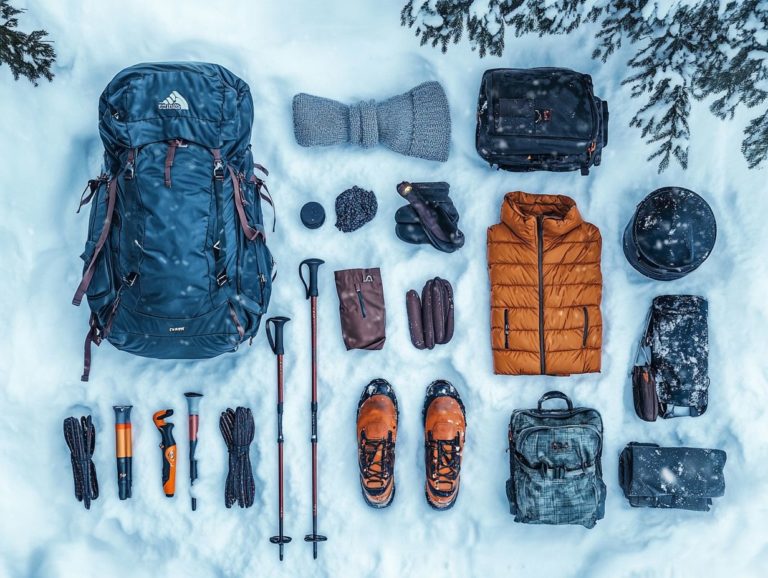How to Overcome Hiking Challenges
Hiking presents an exceptional opportunity for you to connect with nature and push your limits. Yet, it brings along its own set of challenges.
From physical and mental obstacles to unpredictable weather and gear management, each hiker encounters unique hurdles along the trail. This article delves into essential strategies for overcoming these difficulties, offering training tips, mental preparation techniques, and crucial emergency planning insights.
Whether you consider yourself an experienced adventurer or you’re just starting out, you ll uncover ways to enhance your hiking experience and navigate the great outdoors with unwavering confidence.
Contents
- Key Takeaways:
- Physical Preparation for Hiking
- Mental Preparation for Hiking
- Dealing with Weather and Terrain Challenges
- Managing Gear and Equipment Challenges
- Emergency Preparedness for Hiking
- Overcoming Hiking Challenges as a Group
- Frequently Asked Questions
- How can I prepare mentally for hiking challenges?
- How can I improve my stamina for hiking?
- What should I do if I encounter unexpected challenges while hiking?
- How can I prevent injuries while hiking?
- What should I do if I feel overwhelmed or exhausted while hiking?
- How can I stay motivated to overcome hiking challenges?
Key Takeaways:
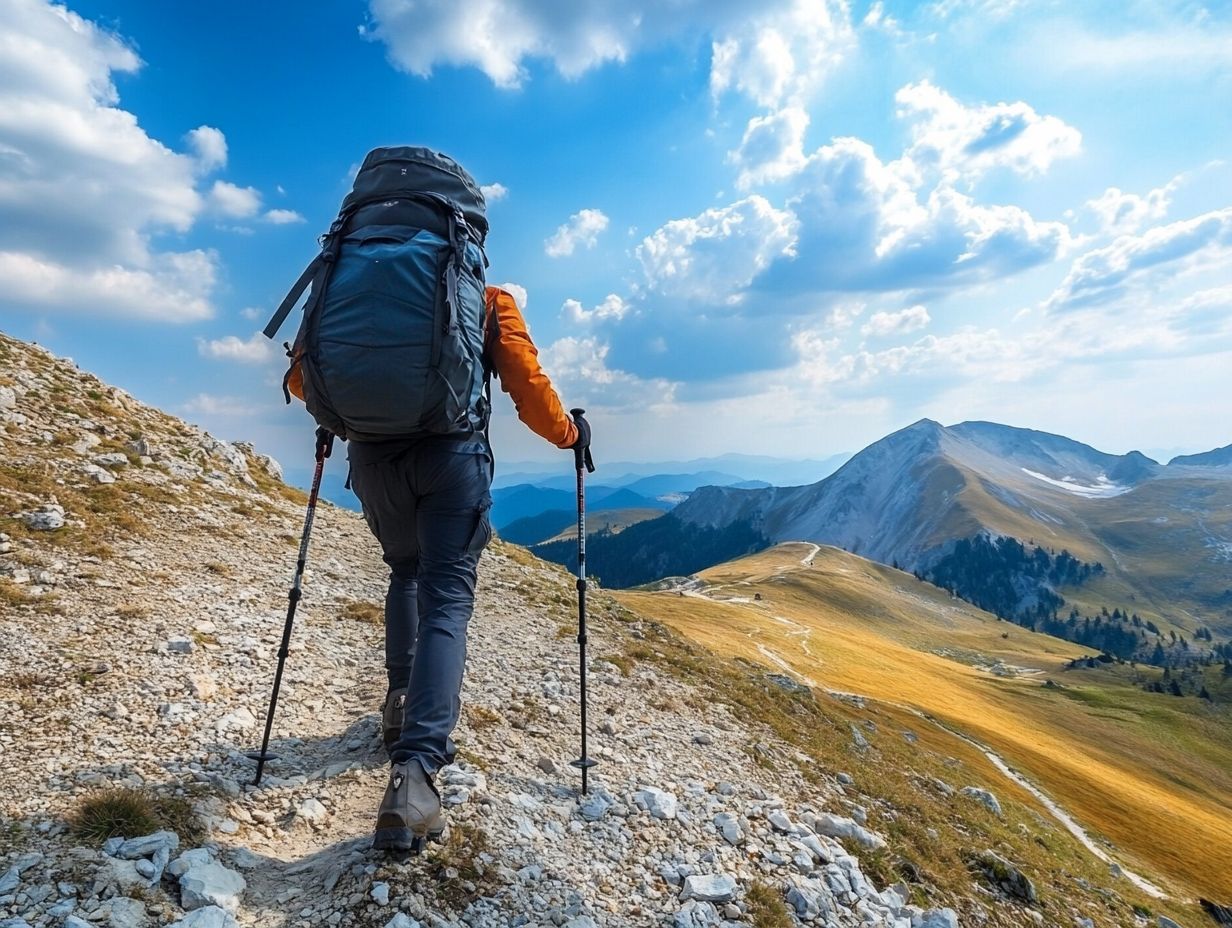
- Train and condition your body before a hike to prevent physical challenges.
- Prepare mentally for potential obstacles on the trail using helpful strategies.
- Be ready for different weather and terrain challenges by planning ahead and packing appropriate gear.
Common Challenges Faced by Hikers
Hiking is a beloved outdoor adventure that offers immense joy, yet it comes with its fair share of challenges. You ll often encounter physical hurdles, like building endurance and navigating tricky terrains.
Mental challenges, such as managing fear and breaking through mental barriers, can also crop up. These challenges influence your emotional well-being and overall hiking experience. Acknowledging these obstacles is crucial for personal growth; they can foster resilience and self-belief within the hiking community.
Injuries, like sprained ankles from uneven surfaces or blisters from long treks, can sideline even the most experienced hikers. Fatigue might make you question your abilities, while the fear of heights can lead to paralyzing moments when you face steep cliffs or narrow paths. These factors impact both your confidence and enjoyment.
Confronting these obstacles helps you develop coping strategies and cultivates a sense of camaraderie among fellow hikers. Sharing struggles and victories can transform your hiking experience into something extraordinary!
Physical Preparation for Hiking
Physical preparation is essential for a successful and enjoyable hiking experience, especially on demanding terrains. By cultivating your hiking skills through targeted training, you enhance your physical endurance, enabling you to tackle challenges with greater ease.
Whether you’re gearing up for a day hike or an extended multi-day adventure, recognizing the critical role of physical preparation helps mitigate risks and elevates your overall experience on the trails.
Training and Conditioning Tips
To prepare effectively for your hiking adventures, establish a training and conditioning regimen that strengthens both your body and hiking skills. Focus on endurance-building through exercises like running, cycling, and swimming to boost your heart health.
Dedicating time to weightlifting or bodyweight exercises such as squats and lunges will improve the muscle strength needed for varied terrains. A flexible schedule with gradual progression in intensity and duration helps your body adapt, minimizing the risk of injury.
Engaging in balance exercises, such as yoga, enhances flexibility and prepares you for navigating uneven surfaces. Crafting a diversified workout plan tailored to your fitness level can markedly elevate your performance on the trails.
Get out there and embark on your next great adventure today!
Mental Preparation for Hiking
Mental preparation is as vital as physical preparation in hiking, especially when it comes to navigating the unique mental challenges that the trail presents. Building a positive mindset and incorporating mindfulness techniques will enable you to confront fears and overcome mental barriers, fostering both self-awareness and confidence in your abilities.
This mental resilience not only elevates your hiking experience but also facilitates personal growth as you tackle various demanding terrains.
Strategies for Overcoming Mental Obstacles
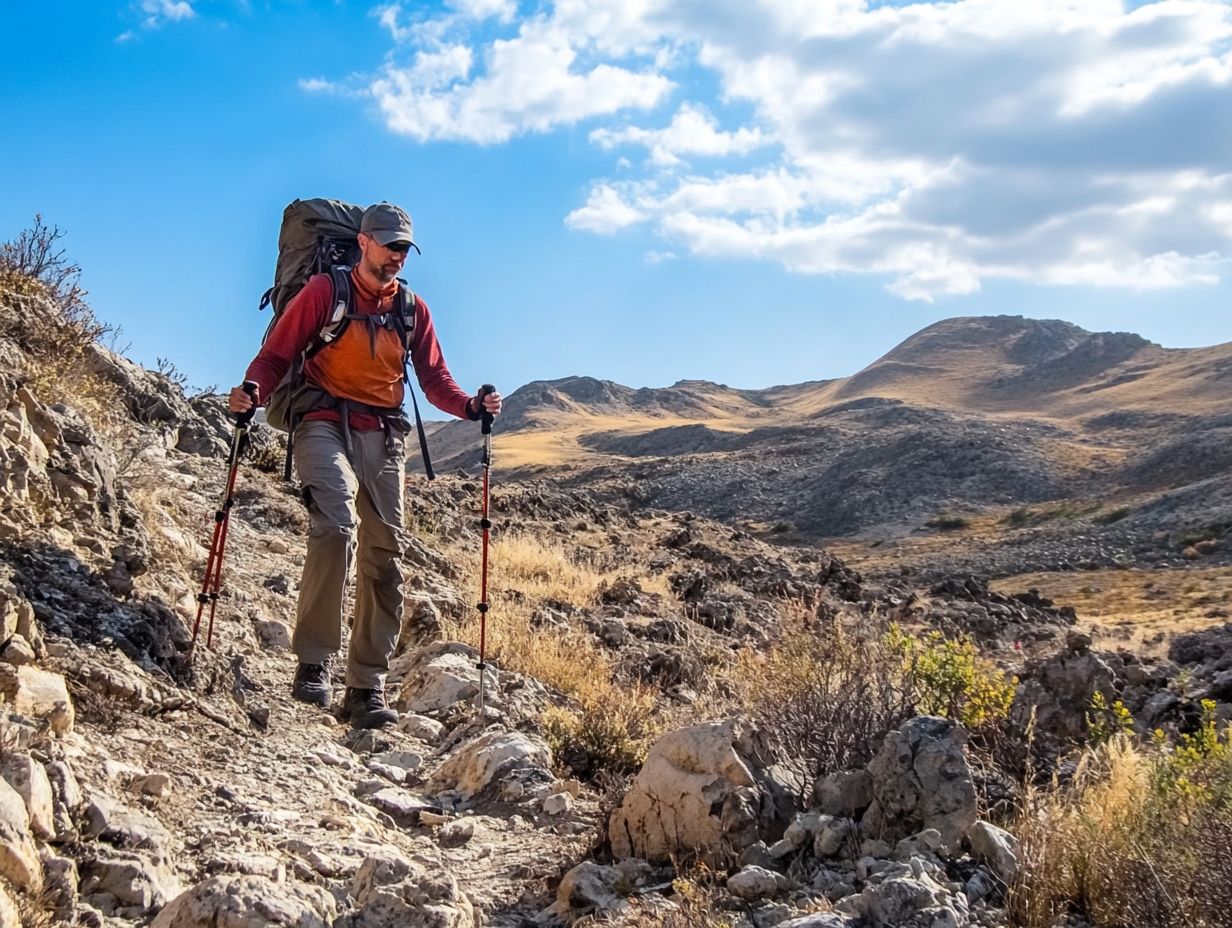
Overcoming mental obstacles while hiking requires you to employ effective strategies that elevate both your emotional well-being and mental resilience. Techniques like visualization, positive affirmations, and mindfulness practices can enable you to manage fears and navigate challenging terrains with newfound confidence.
By envisioning your success on difficult trails, you can reframe your mindset and diminish anxiety about the challenges ahead. For instance, before tackling a steep ascent, picturing each step toward the summit can instill a profound sense of achievement.
Positive affirmations such as “I am strong and capable” can significantly bolster your self-belief during those exhausting climbs. Incorporating mindfulness through deep breathing exercises allows you to stay rooted in the moment, effectively alleviating stress.
These strategies enhance your hiking experience and promote personal growth. As you connect with yourself and others in the hiking community, you can learn how to stay comfortable while hiking, sharing insights and encouragement along the journey, transforming the adventure into something truly enriching.
Dealing with Weather and Terrain Challenges
Navigating the challenges of weather and terrain is essential for enhancing your hiking experience and ensuring your safety. By understanding how to manage varying weather conditions whether it s a sweltering heatwave or an unexpected downpour and honing your navigation skills for difficult terrains, you enable yourself to prepare thoroughly and stay safe on the trail.
Navigating various environments while hiking demands a blend of exceptional navigation skills and a solid grasp of wilderness survival tactics. Whether you’re tackling rocky paths or weaving through dense forests, possessing the right knowledge and preparation can elevate your hiking safety and ensure a rewarding outdoor experience.
Familiarize yourself with tools like maps, compasses, and GPS devices to stay on track! Each provides vital guidance even in the toughest conditions. Understanding how to read topographic maps, which show elevation and land features, is a game changer, offering insights into elevation changes and potential hazards.
Mastering compass usage allows you to orient yourself with confidence. While GPS devices certainly add convenience to your hiking toolkit, it’s always prudent to have a backup navigation method on hand in case technology decides to play tricks on you.
Cultivating wilderness survival skills like setting up a shelter, locating water sources, and identifying edible plants can be invaluable across different terrains and unpredictable weather conditions. With these skills, you’re well-equipped for any adventure that comes your way!
Managing Gear and Equipment Challenges
Managing your gear wisely is key to an amazing hiking adventure! The right hiking gear can profoundly influence both your performance and comfort on the trail.
From selecting the ideal hiking shoes to thoughtfully packing essential items like trail mix, understanding how to maintain and manage your gear becomes crucial for navigating the diverse challenges that hiking presents.
Essential Items and Maintenance Tips
When you’re preparing for a hike, knowing what essential items to pack is key to ensuring a safe and enjoyable experience. This also includes taking care of your hiking gear. A first aid kit, navigation tools, and enough trail mix can make a world of difference, highlighting the importance of being physically prepared.
To ensure that every hike is both comfortable and unforgettable, consider bringing along a sturdy backpack, a reliable water filtration system, and the right clothing layers.
Maintaining your gear is important too. Regularly check for wear on your hiking boots, clean your hydration systems, and store your equipment properly. This attention to detail greatly affects the success of your hike and your overall safety.
Neglecting your gear can lead to inconvenient failures on the trail, turning what should be an exciting adventure into a stressful ordeal.
Ultimately, a thoughtful approach to both packing and upkeep fosters a seamless connection between well-managed equipment and enriching outdoor experiences.
Emergency Preparedness for Hiking
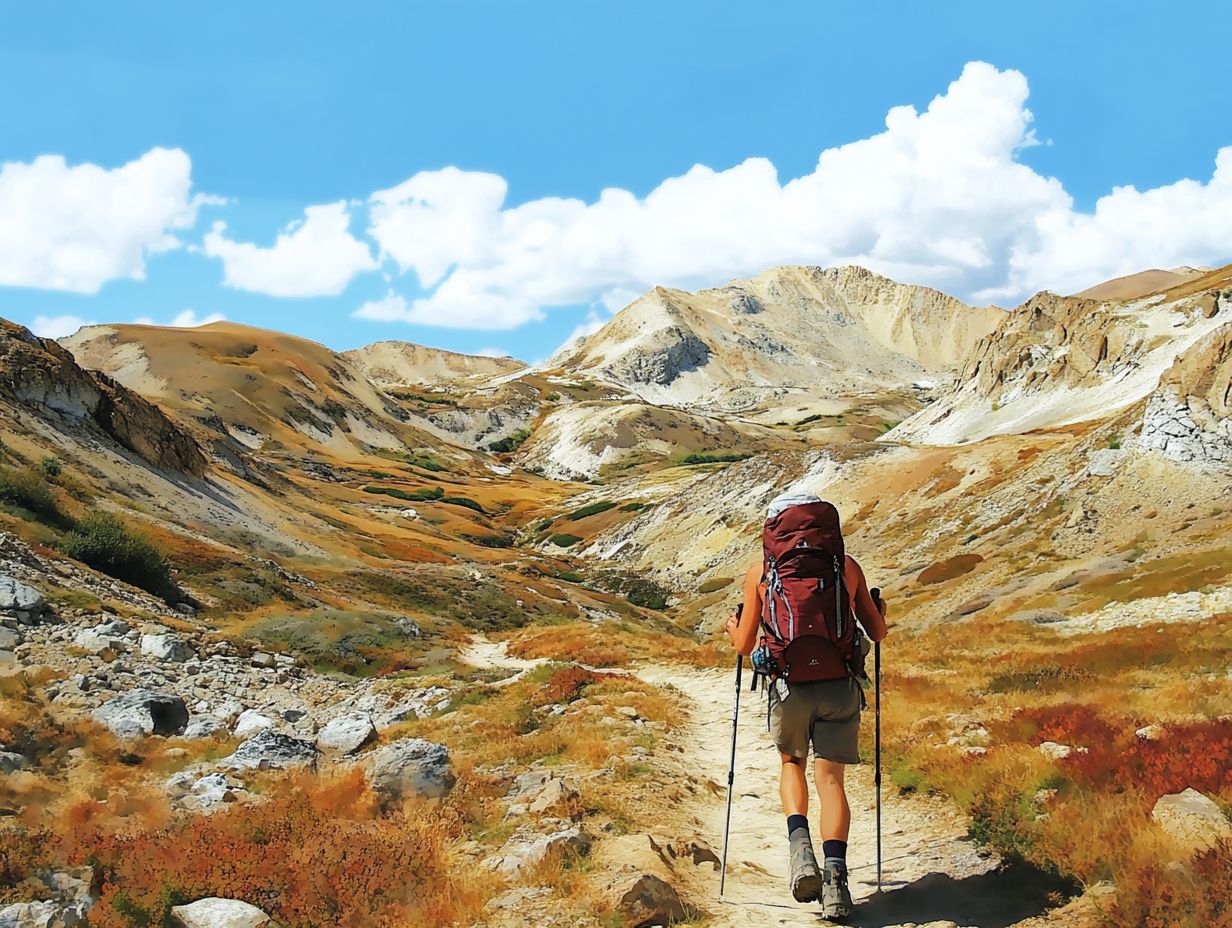
Emergency preparedness is a vital component of hiking, safeguarding your safety and well-being in unexpected situations. By devising a thoughtful plan and packing essential emergency supplies, you enable yourself to tackle unforeseen challenges with confidence, ultimately enriching your overall hiking experience.
Plan Ahead: Pack Essential Emergency Supplies
Creating a well-thought-out plan and packing the right emergency supplies are essential steps in ensuring your hiking safety. Key items include:
- Whistle
- Flashlight
- Wilderness first aid kit
Selecting a suitable route involves assessing your fitness level and understanding the terrain and weather conditions. Mapping out the trail using a GPS or a physical map enhances your navigation skills and reduces the chances of getting lost.
Inform a trustworthy individual about your hiking itinerary, including your expected return times. This ensures they can raise the alarm if needed. Preparing for unexpected situations is crucial; pack essentials like a multi-tool, extra food, water, a compact shelter, and a fire starter to improve your safety.
These precautions can transform a simple hike into a seamless and enjoyable experience, ensuring that you stay prepared and informed throughout your adventure. For more detailed guidance, check out our tips on how to prepare for a long hike.
Overcoming Hiking Challenges as a Group
Overcoming hiking challenges as a group cultivates camaraderie, elevating your overall hiking experience. Engaging in effective communication and implementing teamwork strategies are crucial for navigating difficult terrains and tackling the physical and mental hurdles that arise along the way.
Effective Communication and Teamwork Strategies
Effective communication and teamwork strategies are essential for enhancing the dynamics of the hiking community. Establishing clear roles, sharing experiences, and providing support are vital for success when navigating challenging terrains together.
When you openly share your strengths and experiences, you create an environment of trust and collaboration. Designating a navigator who understands the trail map can alleviate stress and help keep the group on track. Regular check-ins can uplift morale and ensure everyone is pacing appropriately.
Utilizing group decision-making techniques ensures all voices are heard, fostering a sense of ownership over the journey. These practices heighten awareness of each individual’s needs and capabilities, leading to a more fulfilling adventure filled with shared victories and cherished memories.
Frequently Asked Questions
Have questions about hiking? Here are some common queries:
- What should I pack for a day hike?
- How do I choose the right trail?
- What safety measures should I consider?
Remember, being prepared allows you to fully enjoy the beauty of the outdoors. So gear up, plan ahead, and embrace the adventure!
How can I prepare mentally for hiking challenges?
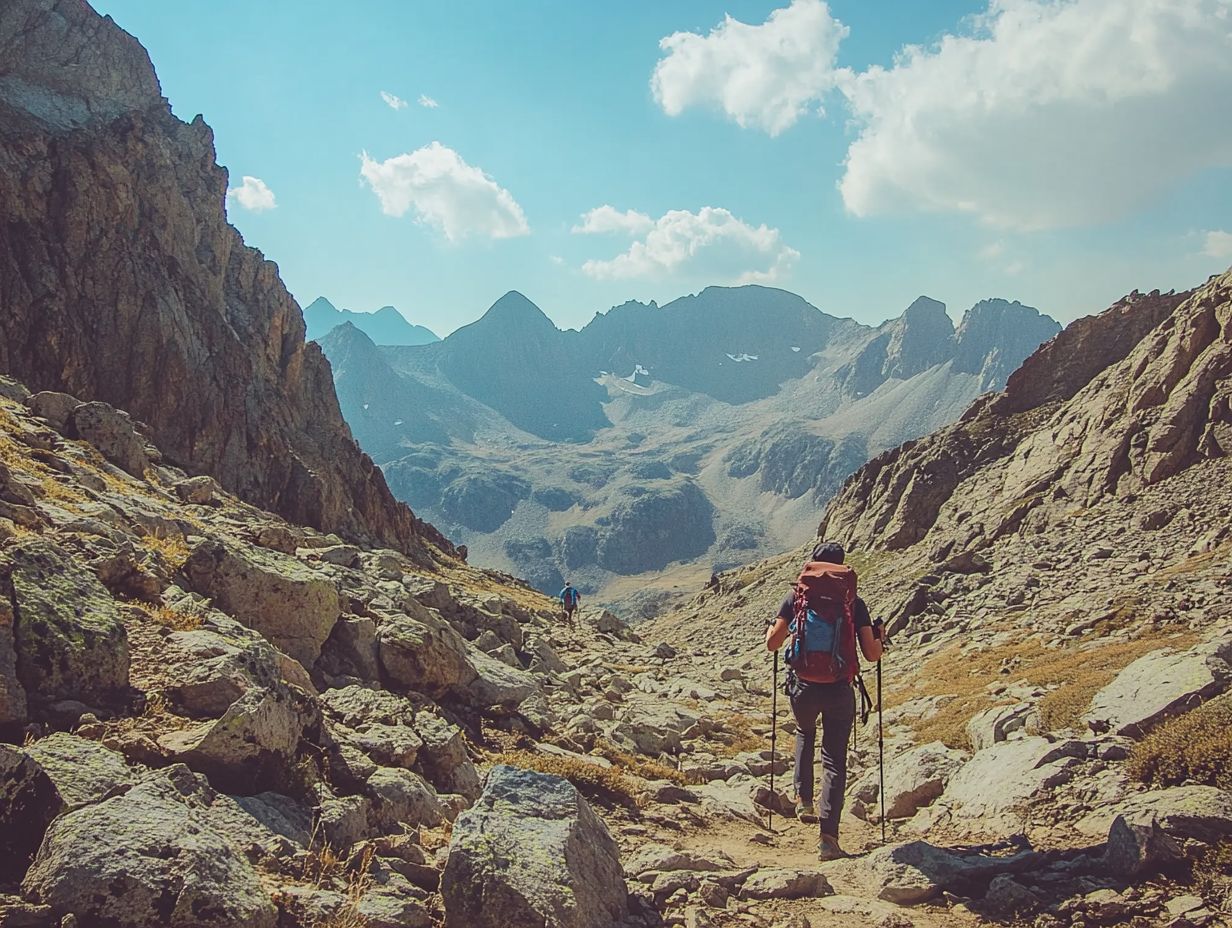
Mentally preparing for hiking challenges is as crucial as being physically ready. Set small, achievable goals and practice positive self-talk.
How can I improve my stamina for hiking?
Engage in regular physical activities like running or cycling to build stamina. Gradually increase the distance and difficulty of your hikes to improve your endurance.
What should I do if I encounter unexpected challenges while hiking?
Stay calm when facing unexpected challenges. Assess the situation and plan your next steps, whether that means changing your route or taking a break.
How can I prevent injuries while hiking?
Wear proper footwear and clothing to avoid injuries. Stretch before and after your hike, listen to your body, stay hydrated, and take breaks when necessary.
What should I do if I feel overwhelmed or exhausted while hiking?
Listen to your body. If you’re overwhelmed or tired, find a safe spot to rest, refuel with snacks and water, and remember to pace yourself.
How can I stay motivated to overcome hiking challenges?
Set specific goals and rewards to keep your motivation high. Hiking with a partner or group can also provide support and remind you of the wonderful benefits hiking offers for your health.


